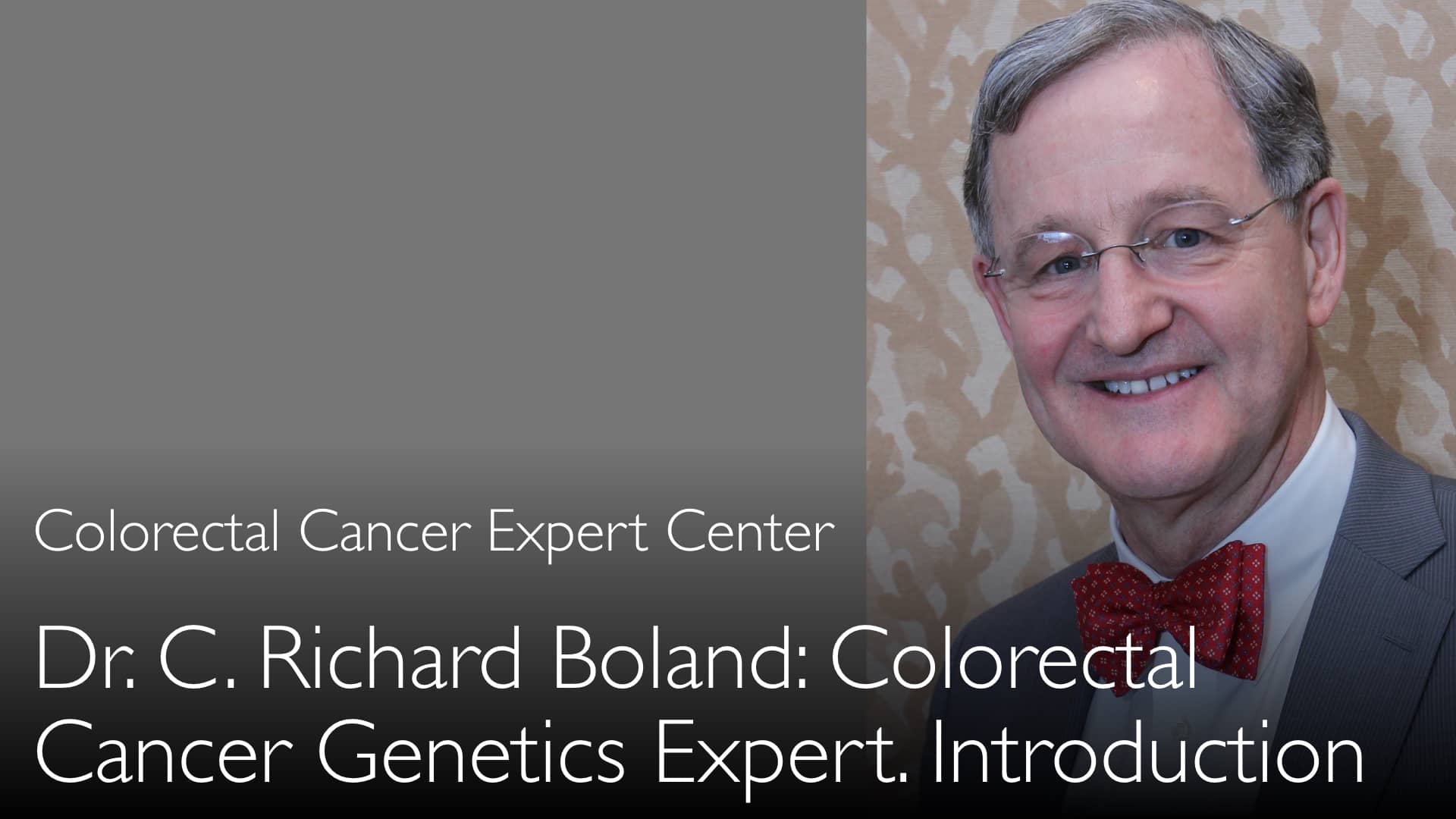C. Richard Boland, MD, a leading expert in the epigenetics of colorectal cancer, explains how DNA methylation patterns and microRNA levels serve as powerful biomarkers for predicting cancer prognosis and enabling personalized treatment. His research has revealed how epigenetic changes influence tumor behavior and how targeted therapies can reverse abnormal DNA methylation to improve patient outcomes.
대장암에서의 후성유전체 바이오마커: DNA 메틸화와 마이크로RNA 예후
목차 바로가기
- 마이크로RNA가 암 진행을 조절하는 방식
- 예후 도구로서의 DNA 메틸화
- 가역적 DNA 메틸화와 치료 가능성
- 개인 맞춤형 암 치료에서의 마이크로RNA
- 후성유전적 변화에 미치는 식이 영향
- 후성유전체 암 연구의 미래 방향
- 전체 대본
마이크로RNA가 암 진행을 조절하는 방식
C. Richard Boland 박사(의학박사)는 마이크로RNA를 대장암에서 유전자 발현의 중요한 조절자로 설명합니다. 이 20염기 길이의 RNA 단편들은 메신저 RNA와 상호작용하여 분해를 조절하며, 수백 개의 유전자에 동시에 영향을 미칩니다. Boland 박사는 "하나의 마이크로RNA가 수십 개에서 수백 개 이상의 메신저 RNA와 상호작용할 수 있다"고 말하며, 암 세포 행동에 대한 체계적 영향을 강조합니다.
연구에 따르면 특정 마이크로RNA 발현 패턴은 종양의 공격성과 치료 반응과 연관됩니다. 이러한 후성유전체 표지자들은 의사들이 질병 경과를 예측하고 개별 환자에게 최적의 치료법을 선택하는 데 도움을 줍니다.
예후 도구로서의 DNA 메틸화
DNA 메틸화 패턴은 대장암 예후를 위한 강력한 바이오마커로 작용합니다. C. Boland 박사(의학박사)는 유전자 돌연변이와 달리 이러한 후성유전적 변화는 역동적이며 잠재적으로 가역적이라고 설명합니다. "DNA 메틸화는 유전자 돌연변이와 다릅니다"라고 그는 말하며, 메틸기가 기저 유전자 코드를 변경하지 않고 DNA에 부착되는 방식을 설명합니다.
비정상적인 메틸화 패턴은 종양 억제 유전자를 침묵시키거나 암유전자를 활성화시켜 암 발생에 직접 기여할 수 있습니다. 임상의들은 현재 이러한 후성유전체 서명을 활용해 환자 위험을 계층화하고 치료 결과를 더 정확하게 예측합니다.
가역적 DNA 메틸화와 치료 가능성
C. Richard Boland 박사(의학박사)는 대장암에서 DNA 메틸화를 표적으로 하는 치료 가능성을 강조합니다. "DNA 메틸화 과정은 조작될 수 있습니다"라고 그는 말하며, DNA에서 메틸기를 제거할 수 있는 기존 약물들을 소개합니다. 현재의 탈메틸화 약물들은 독성 제한이 있지만, 연구는 더 안전한 화합물 개발에 집중되고 있습니다.
후성유전적 변화의 가역적 성질은 영구적인 유전자 돌연변이에 비해 상당한 이점을 제공합니다. C. Boland 박사(의학박사)는 "특정 점 돌연변이가 있는 경우, 오류를 수정할 가능성은 극히 낮습니다"라고 설명하며, 후성유전체 치료법이 특히 유망함을 밝힙니다.
개인 맞춤형 암 치료에서의 마이크로RNA
마이크로RNA 프로파일링은 대장암 환자를 위한 정밀의학 접근법을 가능하게 합니다. Boland 박사의 연구는 이러한 작은 RNA 분자들이 종양 행동과 약물 감수성을 결정하는 복잡한 유전자 네트워크를 어떻게 조율하는지 보여줍니다. "마이크로RNA는 특정 치료에 대한 반응을 조절할 수 있습니다"라고 그는 지적하며, 임상적 관련성을 강조합니다.
환자의 고유한 마이크로RNA 서명을 분석함으로써, 종양 전문의들은 효과가 낮을 가능성이 있는 치료를 피하면서 가장 효과적인 치료법을 예측할 수 있습니다. 이 맞춤형 접근법은 치료 결과를 개선하고 불필요한 부작용을 줄입니다.
후성유전적 변화에 미치는 식이 영향
새로운 증거들은 식이 요인들이 대장암에서 DNA 메틸화 패턴에 영향을 미칠 수 있음을 시사합니다. C. Boland 박사(의학박사)는 "메틸화의 식이 조절"이라는 흥미로운 가능성을 논의하며, 후성유전적 과정을 안전하게 수정하는 천연 화합물에 대한 연구를 언급합니다.
임상 적용은 여전히 개발 중이지만, 이 발견은 암 예방과 보조 치료를 위한 새로운 길을 열었습니다. "잠재적으로 메틸화의 식이 조절도 가능합니다"라고 Boland 박사는 관찰하며, 대장암을 넘어 더 넓은 의미를 강조합니다.
후성유전체 암 연구의 미래 방향
C. Richard Boland 박사(의학박사)는 여러 암 종류에서 후성유전체 연구의 변혁적 가능성을 강조합니다. 비정상적인 DNA 메틸화를 역전시키고 마이크로RNA 활동을 조절하는 능력은 종양학에서 패러다임 전환을 의미합니다. "이는 매우 흥미롭고, 신나며, 중요한 연구 방향입니다"라고 그는 Anton Titov 박사(의학박사)에게 말합니다.
향후 연구는 부작용이 적은 표적 후성유전체 치료법 개발과 초기 암 발견을 위한 신뢰할 수 있는 바이오마커 확인에 집중할 것입니다. 이러한 진전은 전 세계 대장암 환자들의 생존율과 삶의 질을 향상시킬 것으로 기대됩니다.
전체 대본
Anton Titov 박사(의학박사): 후성유전적 변화가 암 예후를 어떻게 예측할 수 있나요? 마이크로RNA가 대장암을 위한 맞춤형 치료 선택에 어떻게 도움이 되나요? DNA 메틸화의 대장암 진행과 치료에서의 역할은 무엇인가요?
C. Boland 박사(의학박사): 암 후성유전체학에서 두 번째 큰 진전은 우리 세포핵 내 비코딩 RNA 중 일부가 마이크로RNA라고 불리는 매우 짧은 RNA 분자들을 만든다는 인식이었습니다. 마이크로RNA는 전사되어 약 20염기 단편으로 처리되며, 이는 헤어핀 구조를 형성합니다. 헤어핀의 말단은 메신저 RNA의 3-프라임 비번역 영역과 상호작용하여 분해를 유도합니다.
C. Boland 박사(의학박사): 이 상호작용은 메신저 RNA 발현 조절의 큰 부분을 차지합니다. 우리는 메신저 RNA를 켜는 것에 많은 시간을 보내지만, 일단 활성화되면 끄는 방법도 반드시 필요합니다. 이것이 세포가 다양한 대사 과정을 조절하는 방식이며, 마이크로RNA 발현이 주요 역할을 합니다.
C. Boland 박사(의학박사): 마이크로RNA의 흥미로운 점은 마이크로RNA와 메신저 RNA 간의 상보적 인식입니다. 하나의 마이크로RNA가 수십 개甚至 수백 개의 메신저 RNA와 상호작용할 수 있습니다. 마이크로RNA를 켜거나 끔으로써 많은 유전자의 발현을 조율할 수 있습니다.
C. Boland 박사(의학박사): 암들은 종종 그들의 행동을 이해하는 데 도움이 되는 특정 마이크로RNA 발현 패턴을 보입니다. 마이크로RNA는 또한 특정 치료에 대한 반응을 조절할 수 있습니다.
Anton Titov 박사(의학박사): 또한, DNA의 메틸화는 영구적이지 않습니다. 귀하의 연구는 DNA 메틸화가 영향을 받을 수 있음을 보여주나요?
C. Boland 박사(의학박사): 네! 정말 좋은 지적입니다. 유전자 돌연변이나 결실이 발생하면, 되돌리기가 매우 어렵습니다. 특정 점 돌연변이는 수정되기 어렵고, 유전자 결실은 영구적입니다. 유전자 중복이 이론적으로 결실된 유전자를 대체할 수는 있지만, 이는 드물게 발생합니다.
C. Boland 박사(의학박사): DNA 메틸화는 다릅니다. 일부 대장암들은 과도한 DNA 메틸화에 의해 주도되지만, 이 과정은 가역적입니다. DNA 메틸트랜스퍼라제는 메틸기를 추가하고, 탈메틸화 효소들은 제거할 수 있습니다. 흥미로운 부분은 DNA 메틸화가 조작될 수 있다는 점입니다.
C. Boland 박사(의학박사): 우리는 DNA 메틸화를 억제할 수 있는 실험실 약물들을 보유하고 있습니다. 일부는 환자들에게 사용되었습니다—독성이 있지만 효과적입니다. 이제 우리는 예측 가능한 방식으로 DNA 메틸화를 안전하게 조작할 수 있는 약물, 음식, 또는 천연 화합물들을 탐구하고 있습니다.
Anton Titov 박사(의학박사): 그것은 매우 흥미롭고, 신나며, 중요한 연구 방향입니다. 잠재적으로 메틸화의 식이 조절도 가능합니다. 이는 대장암뿐만 아니라 다른 암들에게도 중요할 수 있습니다.
C. Boland 박사(의학박사): 네, 확실히 그렇습니다!





